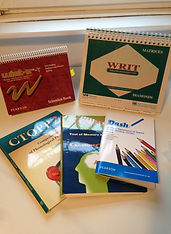
Assessments
Screening
Many schools now have computer screening programs. These may consist of a computer program such as Lucid or GL Assessment’s dyslexia screener but there are many others.
What a screener does
They can be used as the first step in a graduated response
They are a great tool to inform and start interventions.
What screeners aren’t
They may not be standardised and they will not go into depth.
They are not diagnostic tools.
They can be carried out by anyone. No specialist qualification needed
They are more likely to result in a false negative result
Why use a screener?
A screener can help to see which areas require support, assist in choosing which interventions may support a learner in making progress
Full Diagnostic Assessment and Report.
-
Standardised tests are used to build up a full picture of an individual’s areas of strengths and weakness
-
An assessor will use a range of tests which explore different areas such as WRIT, WRAT, WIAT II T, CTOPP2, TOMAL2, TOWRE, DASH, SDMT
-
An assessment will take around 3-4hrs, but doesn’t have to be done in one sitting. Breaks can be taken between test
-
The report written can make judgements about an individual’s learning ability and style and give a diagnosis is necessary.
-
Reports should be written by either a qualified assessor or an Educational Psychologist
-
The report written will be specific to the individual and provide useful details which can be used to assist in maximising progress
-
Following the assessment, a thorough report explaining the findings will be produced.
-
The report will examine the results of the assessment as well as consider the behaviours exhibited during the testing period to provide a holistic view of the learner on the day of the assessment.
-
The report will go on to explain strategies that will support the learner moving forward, with recommendations that will enable the learner to fulfil their potential and minimise the impact of dyslexia
-
Weaknesses may be uncovered. An assessor will know whether there are external factors which are impacting on the performance and will look beyond the test data and holistically at the individual being tested using observation and discussion with the school and/or parents
-
It is important to note that tests don’t diagnose assessors do! Careful observation of how individuals approach test tasks will also help to build up a unique picture. Tests are a snapshot of how an individual performs on a particular day
-
Conclusions and recommendations from this report will be reflective of the individual’s needs taking into account their whole learning profile. It will explain how the individual can negotiate their way through education/ work, ensuring they make the best progress possible, fulfilling their potential.
"Wendy spent time with R... taking her through several diagnostic tests. Her relaxed and empathetic manner put R... at ease."
"...The report produced was extensive and professional."
Assessors
Your assessor should hold at least a level 7 qualification in SpLD and APC
University students…
Did you know that if you have a diagnosis of dyslexia you are entitled to additional funding through the Disabled Students Allowance (DSA)? The funding enables you to purchase specialist equipment such as laptops or dictaphones. More details can be found on the SASC Website (SpLD Assessment Standards Committee) and Student Finance England site. http://media.slc.co.uk/sfe/1718/ft/sfe_dsa_guide_1718_d.pdf
In order to apply for this funding you will need a post 16 assessment carried out by either a specialist teacher holding APC or an Educational Psychologist
Contact us for more details
